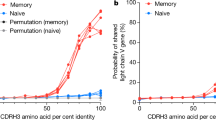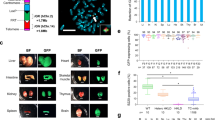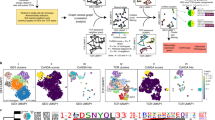Abstract
The major histocompatibility complex (MHC) is composed of a set of linked genes encoding proteins involved in the host's immune response1. A subset of these proteins are the classical transplantation antigens, which are responsible for rapid allograft rejection and are involved in the associative recognition of foreign antigens by cytotoxic T cells1,2. Three different genetic loci coding for the transplantation antigens in humans (HLA-A, -B and -C) and in mice (H–2K, D and L) have been identified3,4; they are highly polymorphic1. The recent molecular cloning of HLA5,6 and H–27,8 cDNA sequences provide the basis for detailed characterization of the genetic organization and expression of the MHC. We report here the identification, by analysis of cDNA clones, of at least three distinct classes of H-2 messenger RNAs that can be differentiated on the basis of their disparate 3′-non-translated regions, and describe an unusual sequence arrangement in one class of H–2-like molecule.
This is a preview of subscription content, access via your institution
Access options
Subscribe to this journal
Receive 51 print issues and online access
$199.00 per year
only $3.90 per issue
Buy this article
- Purchase on Springer Link
- Instant access to full article PDF
Prices may be subject to local taxes which are calculated during checkout
Similar content being viewed by others
References
Klein, J. Science 203, 516–521 (1979).
Zinkernagel, R. M. & Doherty, P. C. Adv. Immun. 27, 51–177 (1979).
Ploegh, H. L., Orr, H. T. & Strominger, J. L. Cell 24, 287–299 (1981).
Nathenson, S. G. et al. A. Rev. Biochem. 50, 1025–1052 (1981).
Ploegh, H. L., Orr, H. T. & Strominger, J. L. Proc. natn. Acad. Sci. U.S.A. 77, 6081–6085 (1980).
Sood, A. K., Pereira, D. & Weissman, S. M. Proc. natn. Acad. Sci. U.S.A. 78, 616–620 (1981).
Kvist, S. et al. Proc. natn. Acad. Sci. U.S.A. 78, 2772–2776 (1981).
Steinmetz, M. et al. Cell 24, 125–134 (1981).
Norgard, M. V., Tocci, M. J. & Monahan, J. J. J. biol. Chem. 255, 7665–7672 (1980).
Bregegere, F. et al. Nature 292, 78–81 (1981).
Steinmetz, M. et al. Cell 25, 683–692 (1981).
Southern, E. M. J. molec. Biol. 98, 503–517 (1975).
Rigby, P. W. J., Dieckmann, M., Rhodes, C. & Berg, P. J. molec. Biol. 113, 237–251 (1977).
Maxam, A. M. & Gilbert, W. Meth. Enzym. 65, 499–560 (1980).
Maat, J. & Smith, A. J. H. Nucleic Acids Res. 5, 4537–4545 (1978).
Seif, I., Khoury, G. & Dhar, R. Nucleic Acids Res. 8, 2225–2240 (1980).
Author information
Authors and Affiliations
Rights and permissions
About this article
Cite this article
Cosman, D., Khoury, G. & Jay, G. Three classes of mouse H–2 messenger RNA distinguished by analysis of cDNA clones. Nature 295, 73–76 (1982). https://doi.org/10.1038/295073a0
Received:
Accepted:
Issue Date:
DOI: https://doi.org/10.1038/295073a0
This article is cited by
-
Characterization of five distinct cDNA clones encoding for class I RT1 antigens
Immunogenetics (1989)
-
New evidence fortrans-species evolution of theH-2 class I polymorphism
Immunogenetics (1989)
-
Molecular biology of the mouse Q region
Immunologic Research (1987)
-
Molecular analysis of membrane immunoglobulin-negative variants
Immunogenetics (1986)
-
Occurrence of a unique MHC class I gene in distantly related members of the genus Mus
Immunogenetics (1985)
Comments
By submitting a comment you agree to abide by our Terms and Community Guidelines. If you find something abusive or that does not comply with our terms or guidelines please flag it as inappropriate.



